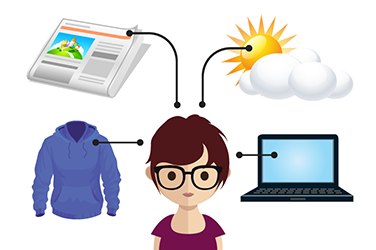When we learn a language, especially at school, we study grammar rules and verb conjugations, we memorize sentences and sometimes even word lists. But when the time comes to speak, we may feel unable to express our ideas clearly. Maybe we don’t have enough vocabulary to do so, or maybe the vocabulary we do have isn’t useful in that situation.
For example, let’s say you have to give your opinion on city traffic. You know what your view is, but you lack the specific vocabulary to express it. Or let’s take a simpler, everyday example. After many hours of studying French, you want to explain how to prepare one of your favourite recipes. You know the verbs you need for the steps, but you don’t know the words for the ingredients. Or vice versa: you know the words for the ingredients, but not the verbs for the steps. So what can you do to enrich your vocabulary in a practical way, without creating or memorizing word lists?
Through my experience as a French teacher and also as a foreign language learner, I’ve discovered a few simple but effective strategies for learning new words. Here are some everyday tips you may find helpful:
1. Read the French version of product labels
Here in Canada, we have the wonderful advantage of having the labels of many products written in both official languages, English and French.
2. Make French the display language on your electronic devices
Change the language setting to French on your computer, cellphone or tablet.
3. Read the news in French
When you read a French newspaper, choose a news article, pick out the important words, and look them up in the dictionary.
4. Write a page in your journal for each of your daily activities
For example, if you go to the gym, at the end of your workout, write up a summary to learn the French words for the machines and the muscles you used, and the exercises you did.
5. Check the weather forecast in French
Break the ice with any Francophone by using the appropriate words to describe the weather in each season.
6. Find out the French name for your favourite articles of clothing for every season
This way, each time you wear those items of clothing, you’ll think of their French name. And you’ll find shopping easier when you visit a Francophone province.
7. Create a Twitter account in French
Even if you don’t like social media very much, you can still learn vocabulary for topics that interest you by following the accounts of people, groups and organizations (like the Language Portal of Canada) that matter to you.
8. Add French captions to your photos
Why not create an Instagram account specifically to write French captions under your photos? You can also ask your (new) Francophone friends to suggest captions.
9. Enrich your vocabulary through play
Click on Jeux sur le vocabulaire (vocabulary quizzes) on the Resources of the Language Portal of Canada website, and you’ll find a variety of quizzes that will help you discover new French words or refresh your memory of old ones.
10. Research vocabulary related to a topic that interests you
TERMIUM Plus®, a terminology and linguistic data bank, lists numerous terms by subject field. That really helps in retaining concepts and applying them in everyday life.
Now, it’s your turn! What tips would you add to this list? In the Comments section, share your ideas (or your friends’ ideas) for learning new vocabulary. Thanks in advance!
Translated by Josephine Versace, Language Portal of Canada
